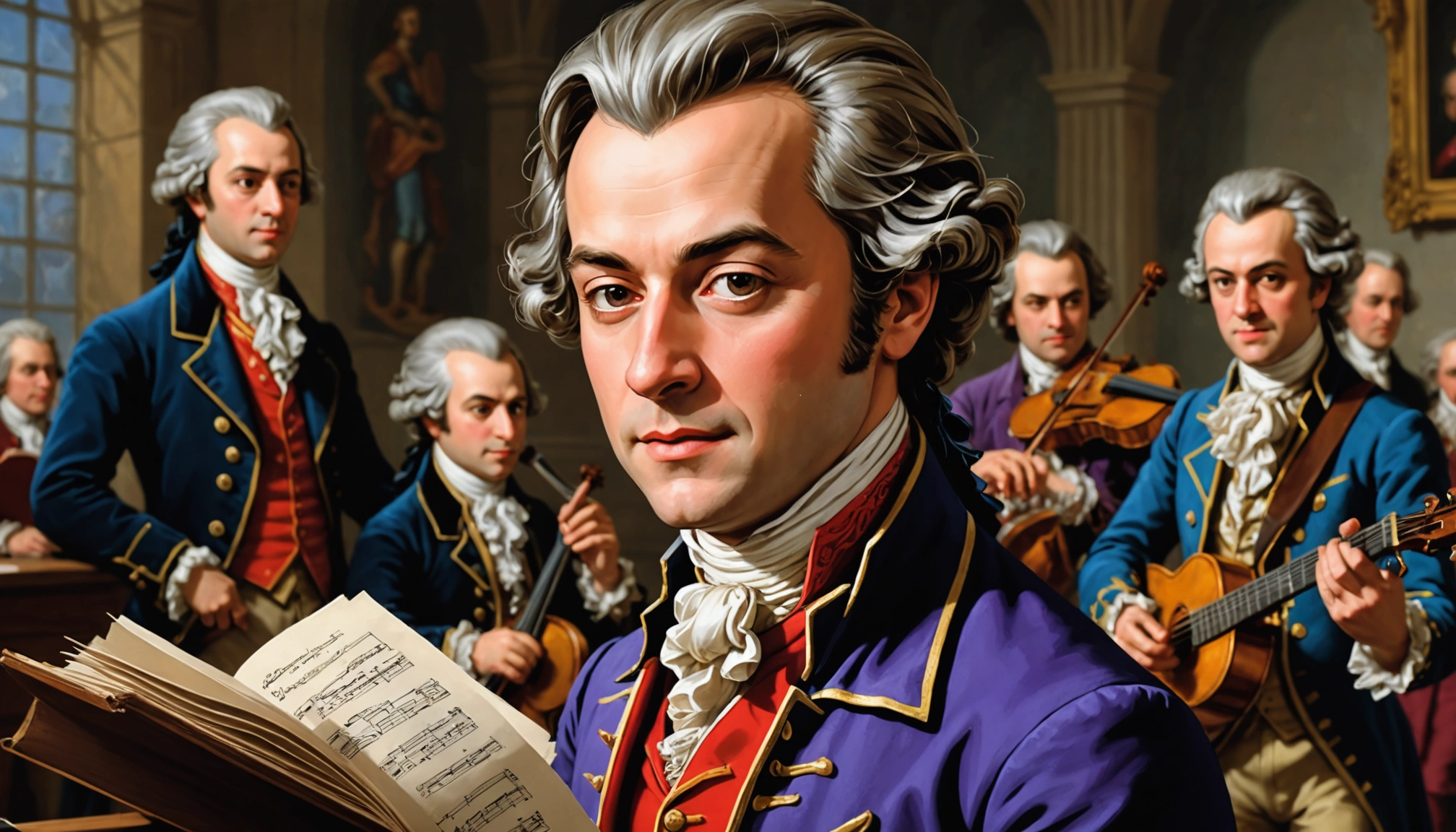Mozart: A Life Beyond the Music – Exploring the Composer's Friendships and Social World

Wolfgang Amadeus Mozart, a name synonymous with musical genius, often conjures images of a solitary figure composing masterpieces in isolation. However, beyond the scores and symphonies, Mozart lived a vibrant life filled with friendships, collaborations, and social connections that shaped both his personal experiences and his musical output. While his family relationships, particularly with his father, Leopold, were complex, Mozart cultivated a network of friends and colleagues who provided support, inspiration, and companionship throughout his short but prolific life.
Family Bonds and Early Influences
Mozart's early life was dominated by his family, particularly his father, Leopold, a composer and violinist who recognized and nurtured his son's extraordinary talent. Leopold served as Wolfgang's teacher, manager, and primary caregiver, guiding him through the courts of Europe as a child prodigy. Mozart also shared a close bond with his older sister, Maria Anna, nicknamed Nannerl, who was also a talented musician. The siblings toured together, performing for royalty and captivating audiences with their musical abilities. While these early family connections were strong, they also presented challenges, particularly as Mozart sought independence and artistic freedom in his later years.
Musical Collaborations and Mentorships
As Mozart matured, he formed significant relationships with other musicians, some of whom served as mentors and collaborators. One of the most important of these was Joseph Haydn, a composer 24 years his senior. The two developed a deep friendship and mutual respect. Mozart often referred to Haydn as "Papa Haydn," and dedicated a set of six string quartets to him, a testament to his admiration. Haydn, in turn, recognized Mozart's genius and offered him encouragement and support. Their relationship exemplified a harmonious blend of personal affection and professional support, leaving a lasting impact on the world of classical music.
Mozart also collaborated with several other composers and musicians throughout his career. Johann Christian Bach, whom Mozart met in London as a child, was an early influence, and Mozart later became colleagues and friends with Johann Michael Haydn, Joseph Haydn's younger brother, in Salzburg. He also worked closely with the clarinetist Anton Stadler, for whom he composed the Clarinet Quintet and Clarinet Concerto. These collaborations enriched Mozart's musical experiences and contributed to the diversity of his compositions.
Social Life and Freemasonry
Beyond his musical relationships, Mozart enjoyed an active social life. He lived at the center of the Viennese musical world and knew a significant number of people, including fellow musicians, theatrical performers, Salzburgers, and aristocrats. He enjoyed billiards, dancing, and kept pets, including a canary, a starling, a dog, and a horse.
In 1784, Mozart became a Freemason, joining a fraternal order focused on charitable work, moral uprightness, and the development of fraternal friendship. Freemasonry played a significant role in Mozart's life during his final years, influencing both his personal values and his musical compositions. Many of his friends were Masons, and he composed music for Masonic gatherings, including cantatas and Masonic funeral music. Some scholars interpret his opera The Magic Flute as a Masonic allegory, reflecting the order's ideals of enlightenment and brotherhood.
Challenges and Financial Struggles
Despite his talent and social connections, Mozart faced numerous challenges throughout his life. He struggled to find stable employment, often relying on commissions and patronage from wealthy individuals. His relationship with his father was strained by disagreements over his career choices and his marriage to Constanze Weber. Mozart also experienced financial difficulties, often borrowing money from friends to make ends meet.
One of Mozart's closest friends during his later years was Michael Puchberg, a textile merchant and fellow Mason, who lent him considerable sums of money. Surviving letters reveal Mozart's desperate pleas for financial assistance, offering a glimpse into the composer's struggles and his reliance on the generosity of his friends.
The Enduring Legacy of Friendship
While Mozart's life was marked by both triumphs and tribulations, his friendships provided him with invaluable support and companionship. From his early family bonds to his collaborations with fellow musicians and his involvement in Freemasonry, Mozart's social connections shaped his personal experiences and influenced his artistic output.
Even as Mozart faced increasing illness and loneliness toward the end of his life, he found solace in his music, stating that it was essentially his only friend. This sentiment underscores the profound connection between Mozart's personal life and his creative genius, highlighting the importance of human relationships in shaping the life and legacy of one of history's greatest composers.
In conclusion, Wolfgang Amadeus Mozart was not merely a solitary genius, but a man deeply connected to the world around him. His friendships, collaborations, and social engagements played a vital role in his life, providing him with support, inspiration, and a sense of belonging. By exploring these relationships, we gain a richer understanding of Mozart's life and the forces that shaped his extraordinary musical achievements.
Related Articles

Japan's Animation Industry Embraces AI to Combat Labor Shortages and Boost Creativity

